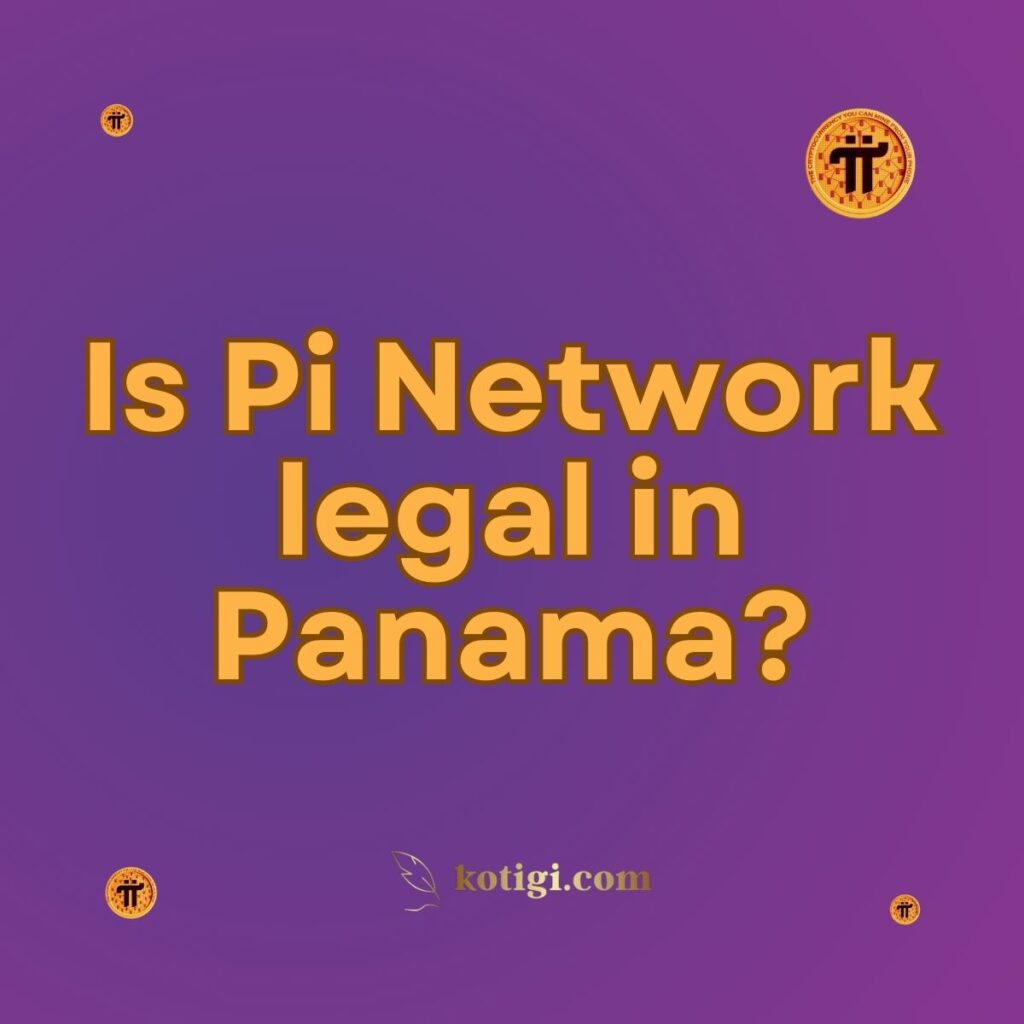
Is Pi Network legal in Panama?
Pi Network is currently legal in Panama, as the country does not have specific laws or regulations governing its use. While Panama is known for its favorable stance on financial innovation and cryptocurrencies, users should remain cautious, as the government continues to develop its regulatory approach toward digital assets, which could impact platforms like Pi Network in the future.
Introduction
Panama is often recognized as a financial hub, known for its openness to innovation and cryptocurrencies. With the rise of platforms like Pi Network, many users in Panama are curious about its legal status and whether they can engage with the platform without legal concerns. Although Panama has not yet established a comprehensive regulatory framework for cryptocurrencies, Pi Network remains legal in the country. This article explores Pi Network’s current legal standing in Panama, the government’s stance on digital currencies, and the potential regulatory developments that may affect users in the future.
Cryptocurrency Regulation in Panama
No Specific Cryptocurrency Legislation
As of now, Panama does not have specific laws that regulate the use of cryptocurrencies like Pi Network. The country has long been known for its flexible financial laws, which have attracted a range of fintech innovations. Cryptocurrencies are neither banned nor officially regulated, which means that Panamanian users can participate in Pi Network without violating any national laws.
The absence of specific regulations, however, places Pi Network in a legal gray area. While Panamanians are free to use the platform, the unregulated nature of cryptocurrencies in the country also means that there are fewer consumer protections.
Government’s Favorable Stance on Digital Innovation
Panama has shown a relatively positive stance toward digital assets, with an emphasis on promoting financial innovation. The government has made steps toward adopting blockchain technology, which could eventually extend to a regulatory framework for cryptocurrencies. In 2022, the Panamanian National Assembly passed a bill aimed at regulating the use of cryptocurrencies, although the president requested further revisions before signing it into law. This shows a progressive attitude toward cryptocurrencies but also indicates that a clear regulatory structure is still being developed.
Pi Network, which operates under the broader cryptocurrency umbrella, benefits from Panama’s openness to financial technology. However, until more definitive regulations are in place, users should proceed with caution when engaging in unregulated platforms.
Pi Network’s Role in Panama’s Financial Ecosystem
Pi Network’s Potential for Financial Inclusion
In a country like Panama, where financial inclusion is a key concern, Pi Network’s model of mobile mining presents an opportunity for more people to participate in the digital economy. The platform allows users to mine Pi coins using only a smartphone, which makes it accessible to those who may not have the resources to engage with traditional cryptocurrencies that require significant computing power.
While Pi Network is legal, the platform’s future in Panama’s financial system depends on the evolving regulatory framework. Users should remain aware of the potential legal and financial implications as the government continues to explore how best to integrate digital assets into the national economy.
Legal Considerations for Panamanian Users
Since Panama has not yet implemented specific cryptocurrency laws, users engaging with Pi Network should consider the risks associated with participating in an unregulated market. The lack of regulation means that participants do not benefit from legal protections in the event of fraud, security breaches, or disputes with the platform.
Pi Network users in Panama should also keep in mind that as the platform transitions to its open mainnet, and Pi coins become tradeable, the Panamanian government may introduce new regulations. This could affect the legal standing of Pi Network and its users in the future.
Regulatory Risks and Potential Developments
Lack of Consumer Protections
One of the key risks for Pi Network users in Panama is the lack of consumer protections in the cryptocurrency space. While Panama’s favorable stance toward innovation has made it a hub for fintech startups, the absence of a clear regulatory framework for cryptocurrencies means that users may face challenges if they encounter issues with the platform.
For instance, if a user experiences fraud or loses access to their Pi coins, there is little legal recourse available. The unregulated environment heightens the importance of cautious participation in Pi Network.
Potential for Future Regulations
Panama is actively working toward creating a more robust regulatory framework for cryptocurrencies, and Pi Network users should be aware that future laws may impact their ability to use the platform. In 2022, the Panamanian National Assembly passed a cryptocurrency bill that aimed to provide legal clarity for digital assets and blockchain technology. Although the bill was sent back for revisions, it signals the government’s intent to regulate the industry more comprehensively.
As Pi Network approaches its open mainnet launch, Panamanian authorities may introduce additional regulations that could affect how users engage with the platform, particularly when it comes to trading Pi coins or using them for transactions.
Pi Network in the Context of Regional and Global Trends
Cryptocurrency Regulation in Latin America
Panama’s approach to cryptocurrency regulation is part of a broader trend in Latin America, where countries like El Salvador and Brazil have taken steps to embrace digital assets. El Salvador famously adopted Bitcoin as legal tender, while Brazil has introduced legislation to regulate the use of cryptocurrencies within its financial system.
These regional developments may influence Panama’s future regulatory approach to platforms like Pi Network. As other Latin American countries continue to create legal frameworks for digital currencies, Panama is likely to follow suit, shaping the future of cryptocurrency use in the country.
Global Cryptocurrency Regulatory Landscape
Globally, countries are grappling with how to regulate cryptocurrencies, with many focusing on creating clear guidelines that protect consumers while fostering innovation. The European Union’s Markets in Crypto-Assets (MiCA) framework, as well as evolving policies in the United States, reflect this balance between promoting fintech and ensuring consumer protection.
Pi Network users in Panama should keep an eye on these global trends, as they may influence how Panama’s government ultimately decides to regulate cryptocurrencies. International developments may also have implications for how Pi Network operates within the country’s financial system.
The Future of Pi Network in Panama
Potential Challenges for the Platform
As Pi Network evolves, it may face new challenges in Panama’s legal landscape. While the platform is currently legal, the government’s ongoing efforts to regulate cryptocurrencies could result in new requirements for platforms like Pi Network. These regulations could affect everything from how users mine Pi coins to how they can trade or use them for transactions.
For now, Panamanian users can engage with Pi Network without legal concerns, but they should be mindful of potential changes in the regulatory environment.
Importance of Staying Informed
Given the rapidly evolving nature of cryptocurrency regulation in Panama and around the world, Pi Network users should stay informed about any legal developments that could impact the platform. Monitoring both local and international trends will help users navigate potential regulatory changes and ensure they remain compliant with the law.
As Pi Network approaches its mainnet launch and Pi coins become tradeable, staying updated on legal developments will be essential for users who want to engage safely with the platform.
Caution for Pi Network Users in Panama
Risks in an Unregulated Market
Since Pi Network operates in an unregulated environment in Panama, users face potential risks due to the lack of legal protections. Without specific regulations, participants have limited options for legal recourse if they encounter issues such as fraud, security breaches, or loss of access to their Pi coins.
While Pi Network is currently legal, Panamanian users should remain cautious and informed about the risks associated with using an unregulated cryptocurrency platform.
Monitoring Legal Developments
As the government continues to assess the risks and benefits of digital currencies, Pi Network users in Panama should stay informed about potential regulatory changes. The Panamanian National Assembly has already shown interest in regulating cryptocurrencies, and future legal measures could impact how Pi Network operates in the country.
By staying updated on legal changes, users can ensure they remain compliant and avoid potential legal issues as the cryptocurrency landscape evolves.
Conclusion
Pi Network is currently legal in Panama, where the government has not imposed specific regulations on the use of cryptocurrencies. While Panama is known for its openness to financial innovation, users should remain cautious as the country continues to develop its regulatory framework for digital assets. As Pi Network transitions to its open mainnet and Pi coins become tradeable, future regulations may impact the platform’s legal standing.
For now, Pi Network users in Panama can participate freely, but they should stay informed about potential regulatory changes that could affect their ability to engage with the platform.
Key Takeaways
- No Specific Cryptocurrency Laws: Panama does not have explicit regulations governing Pi Network, allowing users to engage freely with the platform.
- Government’s Openness to Innovation: Panama has shown a favorable stance toward financial innovation, which benefits platforms like Pi Network.
- Unregulated Market Risks: Pi Network operates in an unregulated environment in Panama, meaning users have limited legal protections.
- Future Regulations Possible: Panama may introduce new cryptocurrency regulations in the future, particularly as Pi Network’s coins become tradeable.
- Stay Informed: Panamanian users should monitor both local and global regulatory trends to ensure they remain compliant with any future legal changes.





